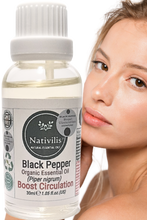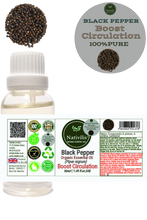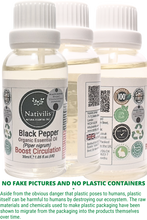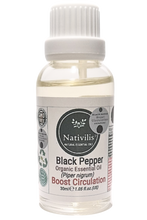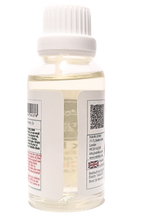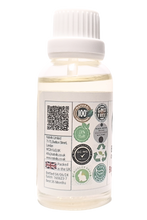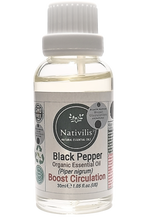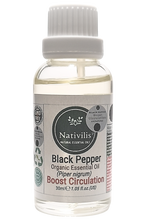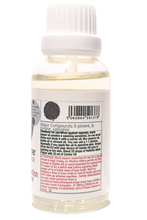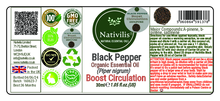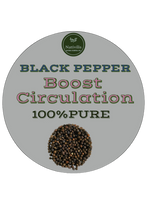
 Black pepper is one of the most widely used spices on the planet. It’s valued not only as a flavoring agent in our meals, but also for a variety of other purposes, such as medicinal uses, as a preservative and in perfumery. In recent decades, scientific research has explored the many possible benefits of black pepper essential oil such as relief from aches and pains, lowering cholesterol, detoxifying the body and enhancing circulation, among many more.
Black pepper is one of the most widely used spices on the planet. It’s valued not only as a flavoring agent in our meals, but also for a variety of other purposes, such as medicinal uses, as a preservative and in perfumery. In recent decades, scientific research has explored the many possible benefits of black pepper essential oil such as relief from aches and pains, lowering cholesterol, detoxifying the body and enhancing circulation, among many more.
Black pepper’s major active principle, piperine, has been shown to have many beneficial health attributes including possible anticancer properties, which is why researchers have looked at it for inclusion in diet therapy for cancer treatment as well as cancer prevention.
10 Black Pepper Essential Oil Benefits
1. Relieves Aches and Pains
Because of its warming, anti-inflammatory and antispasmodic properties, black pepper oil works to reduce muscle injuries, tendonitis, and symptoms of arthritis and rheumatism.
A 2014 study published in the Journal of Alternative and Complementary Medicine assessed the efficacy of aromatic essential oils on neck pain. When patients applied a cream composed of black pepper, marjoram, lavender and peppermint essential oils to the neck daily for a four-week period, the group reported improved pain tolerance and significant improvement of neck pain.
2. Aids Digestion
Black pepper oil may help ease the discomfort of constipation, diarrhea and gas. In vitro and in vivo animal research has shown that depending on the dosage, black pepper’s piperine exhibits antidiarrheal and antispasmodic activities or it can actually have a spasmodic effect, which is helpful for constipation relief. Overall, black pepper and piperine appear to have possible medicinal uses for gastrointestinal motility disorders such as irritable bowel syndrome.
A study published in 2013 looked at the effects of piperine on animal subjects with IBS as well as depression-like behavior. The researchers found that the animal subjects who were given piperine showed improvements in behavior as well as an overall improvement in serotonin regulation and balance in both their brains and colons. How is this important to IBS? There is evidence that abnormalities in brain-gut signaling and serotonin metabolism play a role in IBS.
3. Lowers Cholesterol
An animal study on the hypolipidemic (lipid-lowering) effect of black pepper in rats fed a high-fat diet showed a decrease in the levels of cholesterol, free fatty acids, phospholipids and triglycerides. Researchers found that supplementation with black pepper elevated the concentration of HDL (good) cholesterol and reduced the concentration of LDL (bad) cholesterol and VLDL (very low-density lipoprotein) cholesterol in the plasma of rats fed high-fat foods. This is just some of the research that points toward using black pepper essential oil internally to reduce high triglycerides and improve total cholesterol levels.
4. Has Anti-Virulence Properties
The long-term use of antibiotics has resulted in the evolution of multidrug-resistant bacteria. Research published in Applied Microbiology and Biotechnology found that black pepper extract contains anti-virulence properties, meaning it targets bacterial virulence without affecting cell viability, making drug resistance less likely. The study showed that after screening 83 essential oils, black pepper, cananga and myrrh oil inhibited Staphylococcus aureus biofilm formation and “almost abolished” the hemolytic (destruction of red blood cells) activity of S. aureus bacteria.
5. Lowers Blood Pressure
When black pepper essential oil is taken internally, it may promote healthy circulation and even lower high blood pressure. An animal study published in the Journal of Cardiovascular Pharmacology demonstrates how black pepper’s active component, piperine, possesses a blood pressure-lowering effect. (8) Black pepper is known in Ayurvedic medicine for its warming properties that can be helpful to circulation and heart health when used internally or applied topically. Mixing black pepper oil with cinnamon or turmeric essential oil can enhance these warming properties.
6. Exhibits Anticancer Activity
According to a 2010 study conducted at Michigan State University, black pepper extract and its constituents exhibit anti-inflammatory, antioxidant and anticancer activities. The researchers found that the the piperine and alkyl amides found in black pepper both had dose-dependent abilities to inhibit human cancer cell proliferation.
7. Eases Feelings of Anxiety and Cigarette Cravings
Black pepper oil may help reduce cravings for cigarettes and symptoms of anxiety in smokers deprived from smoking. A clinical study published in Drug and Alcohol Dependence found that black pepper oil can suppress certain smoking withdrawal symptoms, including cravings for cigarettes. Forty-eight cigarette smokers participated in a three-hour session conducted after overnight deprivation from smoking. The participants were divided into three groups: one group of smokers puffed on a device that delivered a vapor from black pepper essential oil; a second group puffed on a device with a mint/menthol cartridge; and a third group used a device containing an empty cartridge. After puffing and inhaling from the devices throughout the session, reported cravings for cigarettes were significantly reduced in the black pepper group relative to each of the two control groups.
In addition, negative effects and symptoms of anxiety were alleviated in the black pepper group, and participants reported that the intensity of sensations in the chest were much greater with the black pepper cartridge. The results of this study suggest that respiratory tract sensations are a key aspect of mitigating smoking withdrawal symptoms. The researchers also conclude that, “Cigarette substitutes delivering black pepper constituents may prove useful in smoking cessation treatment.”
8. Helps Detoxify the Body
Black pepper (Piper nigrum) and piperine has been shown to have “biotransformative effects” including detoxification and enhanced absorption and bioavailability of herbal and conventional drugs. This is why you may see piperine as an ingredient in your supplements.
A 2013 animal study published in Cell Biochemistry and Biophysics found that piperine supplementation helped normalize blood pressure, improve glucose tolerance, decrease inflammation and boost liver function in rats fed a high-fat diet. These positive results suggest that piperine may be able to help reduce symptoms of human metabolic syndrome by helping the body to remove toxins and reduce inflammation.
9. Serves as an Appetite Stimulant
Research shows that olfactory stimulation using black pepper essential oil, which is a strong appetite stimulant, can facilitate swallowing in people with neurological disorders. Inhalation and ingestion of black pepper oil activates the insular or orbitofrontal cortex, resulting in improvement of the reflexive swallowing movement.
In 2008, the effects of olfactory stimulation with black pepper oil were investigated in pediatric patients receiving long-term enteral nutrition (feeding with liquid supplements or tube feeding) due to neurological disorders. In eight out of 10 patients, black pepper oil intervention was continued for three months, and five patients showed increases in the amount of oral intake — plus black pepper treatment helped facilitate swallowing movement.
10. Can Be Used as Food Preservative
Black and green pepper essential oils were used in a 2015 in vitro study in order to figure out the antimicrobial activity against microorganisms that cause food spoilage. Researchers found that both pepper oils displayed antimicrobial, antifungal and antibacterial activity, and they successfully inhibited the growth of Staphylococcus aureus bacteria in chicken soup. The results of this study demonstrate how both green pepper and black pepper essential oils “are efficient in controlling the growth of known food-spoilage microorganisms.”
How to Use Black Pepper Oil
Black pepper essential oil is available in some health food stores and online. Black pepper oil can be inhaled directly from the bottle, diffused at home for a warming aroma, taken internally in small doses (always read product direction labels carefully) and applied topically.
When applied topically, black pepper oil creates a warming sensation, so use small doses and dilute it with a carrier oil, like coconut oil, jojoba oil or almond oil. You can use a 1:1 dilution, especially if you apply the oil to sensitive skin.
- To increase circulation and blood flow to the muscles and nerves, add 3–5 drops of black pepper oil to a warm compress and apply to the abdomen or areas of concern.
- To ease the discomfort of constipation, diarrhea and gas, take 1–2 drops of black pepper oil internally by adding it to a smoothie, soup or savory dish. It can also be applied topically to the abdomen.
- To relieve muscle injuries and tendonitis, apply black pepper oil topically to the area of concern.
- To aid respiratory conditions, take internally or inhale the oil directly from the bottle.
- To relieve congested airways, apply 2–3 drops topically to the chest.
- To reduce cigarette cravings, diffuse black pepper oil or inhale it directly from the bottle when having a craving.
- To use it as a natural treatment for arthritis and rheumatism, apply 2–3 drops topically to the area of concern.
- To help detoxify the body, take 1–2 drops internally or apply 2–3 drops topically to the bottoms of the feet.
- To add flavor to soups, stews, baked vegetables, salads and entrees, add 1–2 drops of black pepper essential oil.
- Black Pepper Essential Oil: Plant Origin and Chemical Composition
- Black pepper essential oil is extracted either through CO2 extraction or steam distillation. The essential oil has a spicy, warm, peppery and musky aroma. It’s commonly used to aid the digestive and nervous systems — stimulating circulation and promoting emotional balance. Black pepper possesses a unique versatility that’s both energizing and warming. In addition to invigorating the senses, it can be used to enhance mental clarity, and it’s a favorite among athletes and those with active lifestyles because it has warming and energizing properties.
Black pepper essential oil is also an important health food due to its antioxidant, antimicrobial potential and gastro-protective modules. With piperine as an active ingredient, black pepper holds rich phytochemistry that also includes volatile oils, oleoresins and alkaloids. Animal research has demonstrated how piperine assists in cognitive brain functioning, boosts nutrient absorption and improves gastrointestinal functionality. Animal research has also found that the free-scavenging activity of black pepper and its active ingredients may make it helpful to regulate tumor progression and also act as a general chemoprevention substance.
Archaeological evidence of pepper use goes back to at least 2000 B.C. in India. References to pepper appear in Greek and Roman texts, suggesting an ancient trade between India and the West. The Romans loved adding pepper to their food; in fact, in the oldest known cookbook in existence, 80 percent of the recipes contain the spice. Signs of an ancient pepper trade from India to Egypt have also been found, including peppercorns that had been stuffed into the nostrils of Ramses the Great when he was mummified.
Black Pepper Essential Oil Precautions
Black pepper essential oil can be a strong irritant in high doses, so dilution with a carrier oil (like coconut or jojoba oil) is recommended for topical use. It’s smart to try a patch test before applying black pepper oil to a larger area of your body. Start by applying a drop to your wrist or foot to make sure you won’t have an adverse reaction.
Always read product instructions carefully before using black pepper oil internally and as I mentioned earlier, always look for the highest quality oil.
If you are currently taking any medications or have any ongoing health issues, speak with your doctor before using black pepper essential oil. Also speak with your doctor first before using this oil topically or internally if you are pregnant or nursing.
Black pepper essential oil has a spicy, warm, peppery and musky aroma. It’s commonly used to aid the digestive and nervous systems — stimulating circulation, promoting emotional balance, stimulating appetite and reducing cholesterol levels.
One of the not yet well-researched benefits of black pepper oil is its ability to help you quit smoking. The warming sensation black pepper oil creates in the throat and chest when inhaled has proved to help people quit smoking more easily. Black pepper oil also helps ease anxiety and nervousness when inhaled or diffused.
If you use black pepper oil topically, dilute it with a carrier oil first because it can be a strong irritant.
- Nativilis Black Pepper Organic Essential Oil 30 ml (Piper nigrum) - Ease aching muscles boost the immune system improves circulation - Copaiba Properties
- Piper nigrum
- Extraction:Steam-distillation
- Origin: Madagascar/Sri Lanka
- Aroma: Pungent, warm and spicy aroma
- Major Compounds: A-pinene, b-pinene, sabinene (See COA - Nativilis Black Pepper Organic Essential Oil 30 ml (Piper nigrum)
-
Best Use: 24 Months
- Shipping Weight:0.08 kg
- SKU: SKU-5060864591378-30
- Type: GTIN-13 - Number: 5060864591378
- Batch Number: 160623-7
- Volume: 30 ml - Clear Bottle Glass with Tamper Evident Euro Drop Cap
- Dimensions Outer Packaging Recyclable Tube Cardboard Paper Kraft :102 mm (H) x 36 mm (D)
-
Safety data: External use recommended. Internal use under guidance from
a qualified practitioner. Keep away from children and eyes. Avoid if pregnant. Store in a cool dry place. - Clear Glass Bottle: We sell our Essential Oil in clear glass bottles to be able to appreciate their beautiful and therapeutic colours.
- The Outer Packaging Recyclable Tube Cardboard Paper Kraft are to protect the oil from light , because light slowly degrades the oil over time.












